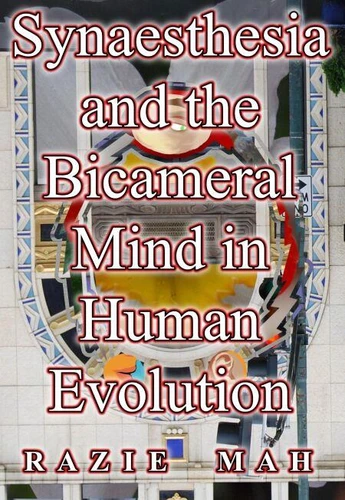Synaesthesia and the Bicameral Mind in Human Evolution. Buttressing the Human Niche
Par :Formats :
Disponible dans votre compte client Decitre ou Furet du Nord dès validation de votre commande. Le format ePub est :
- Compatible avec une lecture sur My Vivlio (smartphone, tablette, ordinateur)
- Compatible avec une lecture sur liseuses Vivlio
- Pour les liseuses autres que Vivlio, vous devez utiliser le logiciel Adobe Digital Edition. Non compatible avec la lecture sur les liseuses Kindle, Remarkable et Sony
 , qui est-ce ?
, qui est-ce ?Notre partenaire de plateforme de lecture numérique où vous retrouverez l'ensemble de vos ebooks gratuitement
Pour en savoir plus sur nos ebooks, consultez notre aide en ligne ici
- FormatePub
- ISBN978-1-955931-24-3
- EAN9781955931243
- Date de parution26/05/2025
- Protection num.pas de protection
- Infos supplémentairesepub
- ÉditeurRazie Mah
Résumé
This works comments on two books that are related in a surprising manner. The first book reviewed is Steven Mithen's 2024 book, The Language Puzzle. The second book reviewed is Julian Jaynes's 1976 book, The Origin of Consciousness in the Breakdown of the Bicameral Mind. The first book solves a scientific question that the author explicitly dismisses. How does language evolve in the milieu of hand talk? It cannot, the author asserts. But, the author also drops many hints that says that it does. Not only that, but speech is added to fully linguistic hand talk before the emergence of our own species, Homo sapiens.
Yes, the author explicitly rules out a possible solution and then offers clues indicating that the ruled-out solution is possible. The second book addresses the implications. Why does one's subjective consciousness explicitly rule out a proposition that one's intuition extols? Yes, one can list the reasons. Plus, they may sound reasonable. But, one's intuition is built into one's cognitive system. It is an adaptation that keeps on working, even when one's list of reasons sounds convincing. Julian Jaynes calls that intuition, "the bicameral mind".
These books address key issues concerning hominin evolution after the domestication of fire. Razie Mah's examinations add value to the arguments, by associating each author's claims to purely relational structures based on the philosophy of Charles Peirce. What do these associations imply? Take a look and see.
Yes, the author explicitly rules out a possible solution and then offers clues indicating that the ruled-out solution is possible. The second book addresses the implications. Why does one's subjective consciousness explicitly rule out a proposition that one's intuition extols? Yes, one can list the reasons. Plus, they may sound reasonable. But, one's intuition is built into one's cognitive system. It is an adaptation that keeps on working, even when one's list of reasons sounds convincing. Julian Jaynes calls that intuition, "the bicameral mind".
These books address key issues concerning hominin evolution after the domestication of fire. Razie Mah's examinations add value to the arguments, by associating each author's claims to purely relational structures based on the philosophy of Charles Peirce. What do these associations imply? Take a look and see.
This works comments on two books that are related in a surprising manner. The first book reviewed is Steven Mithen's 2024 book, The Language Puzzle. The second book reviewed is Julian Jaynes's 1976 book, The Origin of Consciousness in the Breakdown of the Bicameral Mind. The first book solves a scientific question that the author explicitly dismisses. How does language evolve in the milieu of hand talk? It cannot, the author asserts. But, the author also drops many hints that says that it does. Not only that, but speech is added to fully linguistic hand talk before the emergence of our own species, Homo sapiens.
Yes, the author explicitly rules out a possible solution and then offers clues indicating that the ruled-out solution is possible. The second book addresses the implications. Why does one's subjective consciousness explicitly rule out a proposition that one's intuition extols? Yes, one can list the reasons. Plus, they may sound reasonable. But, one's intuition is built into one's cognitive system. It is an adaptation that keeps on working, even when one's list of reasons sounds convincing. Julian Jaynes calls that intuition, "the bicameral mind".
These books address key issues concerning hominin evolution after the domestication of fire. Razie Mah's examinations add value to the arguments, by associating each author's claims to purely relational structures based on the philosophy of Charles Peirce. What do these associations imply? Take a look and see.
Yes, the author explicitly rules out a possible solution and then offers clues indicating that the ruled-out solution is possible. The second book addresses the implications. Why does one's subjective consciousness explicitly rule out a proposition that one's intuition extols? Yes, one can list the reasons. Plus, they may sound reasonable. But, one's intuition is built into one's cognitive system. It is an adaptation that keeps on working, even when one's list of reasons sounds convincing. Julian Jaynes calls that intuition, "the bicameral mind".
These books address key issues concerning hominin evolution after the domestication of fire. Razie Mah's examinations add value to the arguments, by associating each author's claims to purely relational structures based on the philosophy of Charles Peirce. What do these associations imply? Take a look and see.




